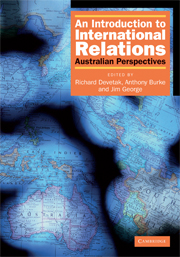Book contents
- Frontmatter
- Contents
- List of tables, figures and boxes
- List of contributors
- Preface and acknowledgments
- An introduction to international relations: the origins and changing agendas of a discipline
- 1 Theory and practice in Australian international relations: the search for identity and security
- Part 1 Theories of international relations
- Part 2 The traditional agenda: states, war and law
- 10 The modern state and its origins
- 11 Nationalism and war
- 12 Security
- 13 Arms control
- 14 The changing character of warfare
- 15 The ethics and laws of war
- 16 International law
- 17 International society and european expansion
- 18 Order and decolonisation in Southeast Asia
- 19 The cold war
- Part 3 The new agenda: globalisation and global governance
- Glossary of terms
- Bibliography
- Index
- References
14 - The changing character of warfare
from Part 2 - The traditional agenda: states, war and law
- Frontmatter
- Contents
- List of tables, figures and boxes
- List of contributors
- Preface and acknowledgments
- An introduction to international relations: the origins and changing agendas of a discipline
- 1 Theory and practice in Australian international relations: the search for identity and security
- Part 1 Theories of international relations
- Part 2 The traditional agenda: states, war and law
- 10 The modern state and its origins
- 11 Nationalism and war
- 12 Security
- 13 Arms control
- 14 The changing character of warfare
- 15 The ethics and laws of war
- 16 International law
- 17 International society and european expansion
- 18 Order and decolonisation in Southeast Asia
- 19 The cold war
- Part 3 The new agenda: globalisation and global governance
- Glossary of terms
- Bibliography
- Index
- References
Summary
Introduction
The discipline of International Relations owes its origins to the study of war and peace. But do the wars of the early twenty-first century differ so fundamentally from their predecessors that they need to be considered in quite different ways? This chapter provides a barometer on the character of warfare and its implications for contemporary international relations. It begins with some comments on the diverse ends and means of warfare before considering five leading issues: the role of violence in warfare, the extent to which that violence is organised, the political nature of war, the interactive nature of warfare, and the scope and scale of war. The overall argument presented here is that while war today may look rather different to wars of earlier periods, much of its essential nature has remained intact. This should make us a bit sceptical about claims that the role of war in international relations has somehow been revolutionised.
The diversity of warfare
Students of International Relations need little reminding that they are traversing a discipline whose leading concepts are hotly contested. But we might be excused for supposing that the meaning and character of something as concrete as war would be an open and shut case. As this author has indicated elsewhere (Ayson 2006: 10–24) the field which looks at the place of war in international politics – strategic studies – often avoids endless debates about meaning and terminology, let alone theory.
Information
- Type
- Chapter
- Information
- An Introduction to International RelationsAustralian Perspectives, pp. 167 - 178Publisher: Cambridge University PressPrint publication year: 2007
